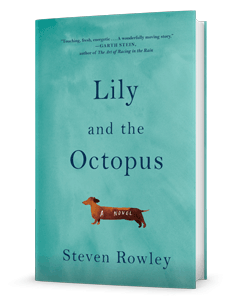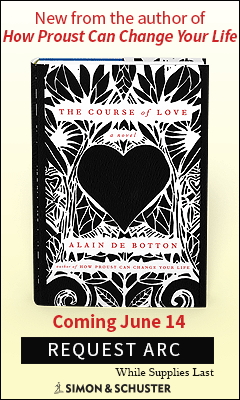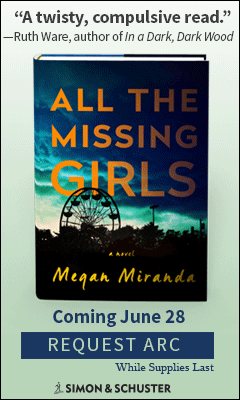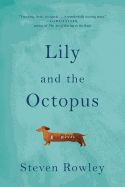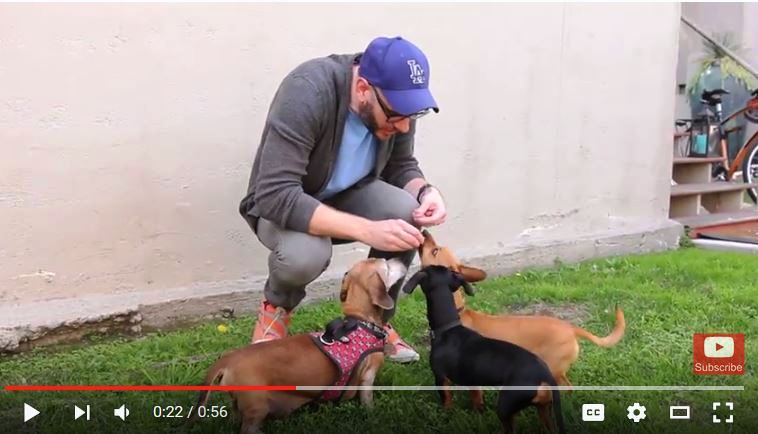Lily and the Octopus
by Steven Rowley
Steven Rowley's first novel, Lily and the Octopus, is a startling, scintillating experience, both funny and emotionally wrenching: a story that shatters all expectations.
In the opening lines, narrator Ted Flask introduces his contented home life with his domestic partner, an aging dachshund named Lily. They live in Los Angeles, where Ted works from home, and they are comfortable in their routines: pizza on Sundays, Monopoly on Fridays, talking about cute boys on Thursdays. They have inside jokes, holiday traditions, and an idyllic story of love at first sight. Lily holds up her end of conversations, although as a dog she is of course distractible, and her memory can be short. Her voice is just as we expect a dog to sound. As a puppy (in flashbacks, as in the scene of their first meeting), her breathless enthusiasm comes out in all caps and exclamation points: "IT'S! A! GREAT! TIME! TO! BE! ALIVE!"
As the novel unfolds and Ted fills out as a character, though, it becomes clear that his life is not necessarily well-rounded. He has a therapist he dislikes; he finds her dim-witted, and in his head runs all her advice past his ideal, imaginary therapist. He has panic attacks. His career has stalled. A long-term relationship, ended 18 months ago, continues to haunt him; recent attempts at dating have gone poorly. Until Lily, he worried that he was unable to open up, unable to love. In Ted's favor, he has a superlative human best friend named Trent, who always comes when called and brings Valium. And, crucially, Ted has Lily. She is the best thing in his disordered and inwardly-turned life.
Those first sentences introducing Lily also introduce the octopus. A new addition to their household, he has a death grip on Lily's head, and he's not going anywhere. Like Lily, the octopus talks. Ted wants him to leave, but the octopus will not let Lily go. She begins to have seizures. She weakens.
Ted dreams of an octopusectomy. The vet offers chemotherapy, radiation and surgery, but is not optimistic about Lily's chances. Ted tries to involve her in the decision-making, but Lily is a dog: her attention span is limited (oh look, red ball!) and, anyway, at 12-and-a-half human years, she has been feeling a little run-down. She rarely speaks in caps anymore. Ted was warned by a vet that, as Lily aged, she would begin to exhibit what he called Enclosed World Syndrome; that is, her perceived world and realm of interest would shrink. It is true, her walks have gotten shorter. Of course, Ted himself has the same malady. As the octopus's tentacles tighten around Lily's precious small head, Ted realizes he has a battle on his hands.
It is easy to fear that the market for books about beloved dogs may be flooded, but this one does something new. Lily and the Octopus is its own beast, and the reader is not the same person at the end as at the beginning. In many ways this is the story of Steven Rowley's life in all its emotional truth, if not in specific, literal details. Ted and Lily's Los Angeles is a thoroughly realistic setting, but a few elements--most obviously the talking octopus--offer boggling departures. By relying on metaphor, Rowley creates a fantasy world with touches of magical realism, somehow both more affecting and more comforting than reality.
Lily and the Octopus comes with the trappings of humor, canine antics, strong characters and profound emotions. Rowley, who is also a screenwriter, peppers the story with Cate Blanchett, Ryans Gosling and Reynolds, Bradleys Cooper and Milton. Equally prominent are the literary references: Kipling's jungle, Auden's "Funeral Blues," and a reading list to prepare for an octopus hunt: Hemingway, Melville, Patrick O'Brian. The book opens in the spirit of a fun read, but the tone quickly deepens to a sadder and a more intense experience. Ted and Lily's story centers around relationships: love and life partnership, the nature of commitment and of loss, and what it looks like to fight for one's friends. As Ted battles the octopus and tries to shore up his darling, he ends up examining every aspect of his own life, his own shortcomings and the strengths he discovers in himself, almost by surprise. His journey, then, is not only about a man and his dog but about breaking out of life's stalemates. This introspection and interior aspect to the novel is only one of the depths that make it both more than another story about a beloved dog, and more than a whimsical work of fantasy--although it is a superb example of both.
Lily and the Octopus is literary and raw, and relentlessly heartfelt. Questions of who and how we love are at its center and, vitally, the question of how we part. Imaginative, ever-astonishing, suspenseful and wise, Rowley's surprising novel is thoroughly gut-wrenching, but well worth the pain. With a winning dog at its robust heart, no reader could ask for more. --Julia Jenkins



